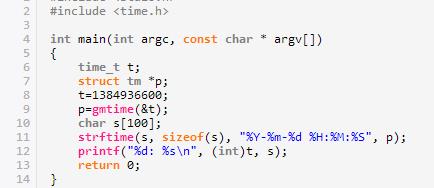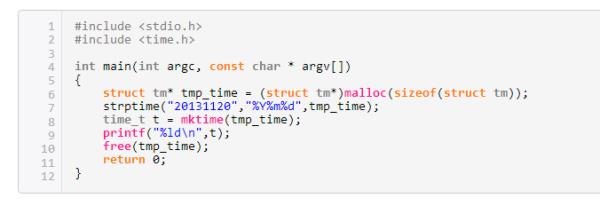如何用python将格式化时间格式转换成正常的时间格式? 例:1478178183000要怎么变成xxxx-xx-xx xx:xx:xx
Posted
tags:
篇首语:本文由小常识网(cha138.com)小编为大家整理,主要介绍了如何用python将格式化时间格式转换成正常的时间格式? 例:1478178183000要怎么变成xxxx-xx-xx xx:xx:xx相关的知识,希望对你有一定的参考价值。
#!/usr/bin/env python# coding=utf-8
#python 2.7
import time
timestamp = 1462451334
#转换成localtime
time_local = time.localtime(timestamp)
#转换成新的时间格式(2016-05-05 20:28:54)
dt = time.strftime("%Y-%m-%d %H:%M:%S",time_local)追问
请问一下,如果我要处理一列的这种数据,要怎么处理??
参考技术A datetime包中的datetime函数,这个是python内建的库如何用c++将一个时间点转换成时间戳
时间戳转格式化。
时间戳转格式化。

格式化转时间戳。

ystemTimeToVariantTime。VariantTimeToSystemTime。
VariantTime是个double类型,单位是天,很便于计算。
SYSTEMTIME是包含年月日时分秒毫秒的一个结构体,便于分析处理。
#include<stdioh>#include<time.h>int main(int argc, const char * argv[time_t t;struct tm *p。
t=1384936600;p=gmtime(&t)char s[100];strftime(s, sizeof(s), "%Y%m%d %H:%M:%S", p);printf("%d%s\\n", (int)t, s);return 0。
#include<stdio.h>#include <time.h>int main(int argcconst char * argv[struct tm* tmp_time = (struct tm*)malloc(sizeof(struct tm));strptime("20131120","%Y%m%dtmp_time);time_t t = mktime(tmp_time);printf("%ld\\n",t),free(tmp_time)return 0。
时间戳转格式化
#include <stdio.h>#include <time.h>
int main(int argc, const char * argv[])
time_t t;
struct tm *p;
t=1384936600;
p=gmtime(&t);
char s[100];
strftime(s, sizeof(s), "%Y-%m-%d %H:%M:%S", p);
printf("%d: %s\\n", (int)t, s);
return 0;
格式化转时间戳
#include <stdio.h>#include <time.h>
int main(int argc, const char * argv[])
struct tm* tmp_time = (struct tm*)malloc(sizeof(struct tm));
strptime("20131120","%Y%m%d",tmp_time);
time_t t = mktime(tmp_time);
printf("%ld\\n",t);
free(tmp_time);
return 0;
本回答被提问者采纳 参考技术B 转成毫秒? 。。。。。。。。。自己乘出来就可以了
以上是关于如何用python将格式化时间格式转换成正常的时间格式? 例:1478178183000要怎么变成xxxx-xx-xx xx:xx:xx的主要内容,如果未能解决你的问题,请参考以下文章